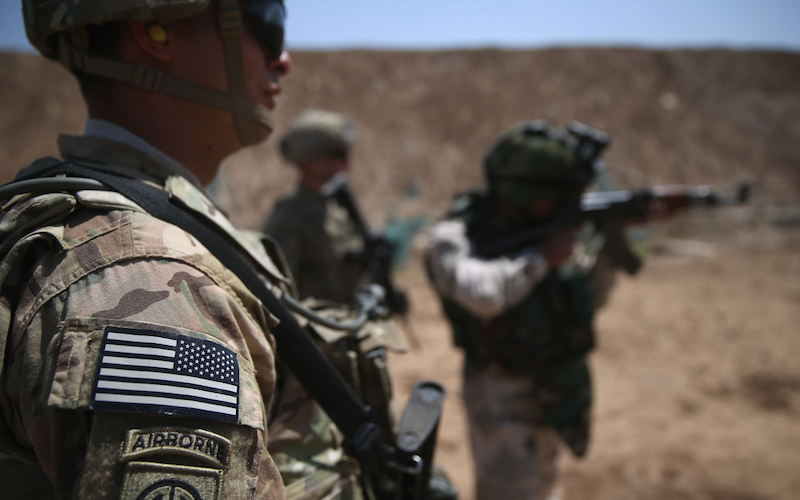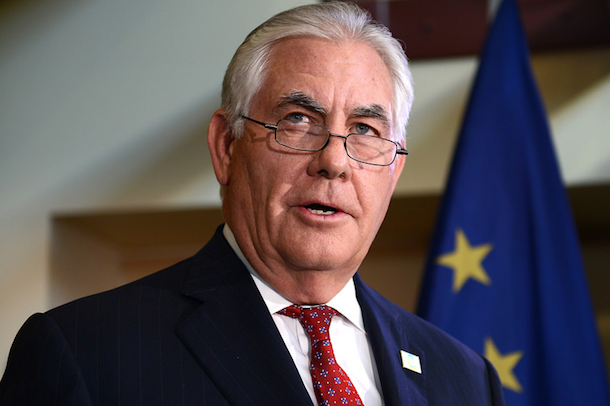
Concerned About U.S. Safety? Focus On More than the Military for National Security
Thinking back to the 2016 campaign season, some of the biggest policy concerns for voters revolved around national security and the safety of Americans. Donald Trump’s immigration plans — building a wall along the Mexican border to keep out criminals and drugs, the Muslim ban — were all necessary measures to protect American citizens from dangers outside our borders. Inciting fear among the electorate paved a clear way for Donald Trump’s isolationist policies to gain traction — starting with the aforementioned safety-oriented proposals, and spreading into economic policies regarding trade (i.e. painting trade partners as enemies and bolstering the ‘America First’ narrative).
Following the themes of campaign promises, the White House confirmed early on that dramatic cuts to the US foreign aid budget would be proposed. Last week we saw the Senate Foreign Relations Committee vote 17–4 to advance the Taylor Force Act to the floor for consideration, which could be the gateway for further legislation limiting foreign aid.
Under the Taylor Force Act, U.S. financial aid to the West Bank and Gaza would be limited until the Palestinian Authority ceases paying terrorists who are guilty of engaging in violence against Israelis and Americans. While it is appropriate for the United States to respond to the misuse of funds with legislation like the Taylor Force Act, it is important to consider instances of misallocation or corruption as isolated incidents, rather than assume these acts are commonplace or rampant. Back in January, Sen. Rand Paul greatly exaggerated that of the foreign aid we supply to developing countries, “70 percent (is) stolen off the top” — implying that aid is routinely stolen.
While supplying aid to nations that rank high on subjective corruption scales may pose a risk to how money is allocated, there are measures in place that work to combat these abuses. As cited in a recent NPR piece, Charles Kenny, an economist and senior fellow at the Center for Global Development, believes that donors like USAID and the World Bank are actually so focused on stopping corruption that worthwhile aid is negatively affected. This issue is outlined in his book, Results Not Receipts: Counting the Right Things in Corruption, where he further discusses data which illustrates that these groups spend more money hunting down instances of fraud rather than measuring how the aid has helped. NPR conducted an interview with Kenny on the issue, in which he claims the evidence at hand regarding corruption doesn’t suggest that it is a big problem. “It isn’t somehow a more fundamental problem than a number of other issues that poor countries face: poor health, limited access to finance, weak infrastructure.”
Kenny cites as an example the years between 2004 and 2010 in Afghanistan. USAID funded vaccinations and neonatal care which increased life expectancy in the area dramatically — from 42 to 62. However, Afghanistan’s Ministry of Health’s accounts showed a gap in spending; $63 million from a total $236 million went unaccounted for. As a result, the special instructor of USAID in Afghanistan recommended that no further funding be supplied — ignoring the clear evidence of the positive impact of the program.
While foreign aid’s main goal is to help other countries, it is important to note that these donations are in the United States’ and the world’s best interests. Aid funds, programs and initiatives translate into improved U.S. and global safety relating to terrorism.
For example, military action is necessary to combat terrorism but counterterrorism measures depend on education, social, and economic initiatives. Thanks to funding through the United Nations (via Member States), as well as additional state funding (USAID), and NGOs (non-governmental organizations — like the Bill and Melinda Gates Foundation), social and economic programs can be initiated and maintained. First, look to education initiatives. In 2012, UN Secretary-General Ban Ki-moon launched a global education initiative as part of the Millennium Development Goals. At the time, an estimated 61 million children of primary school age were out of school, and nearly half lived in countries “afflicted by unrest.” Fostering education in areas of unrest can help combat extremism by giving children a place to grow and learn, and providing direction.

In 1996, after the Taliban overran Kabul, thousands of Afghan teachers and educators were forced to leave the country, and education for girls was banned in areas under their control. The group barred literature, art, and science that did not align with their message. Since then, there has been a push (in Afghanistan and other areas) to use education as a means to rehabilitate and re-educate potential recruits. Today, we witness similar tailored education programs as a result of the unrest in Syria. The Islamic State “through textbooks and phone apps…teaches kids math with AK-47s and grammar with tanks.” Children are recruited by groups like ISIS when schools are destroyed, families separated, and there’s nowhere left to turn. They’re bribed into joining — both children and men alike — through the promise of food, water, and safety. Children are even provided drugs and forced to commit violence on behalf of the group. It is important to help guide children away from these groups and provide stability elsewhere.
The millions of children who have fled the civil war to live in camps around Turkey, Jordan, Iraq, and Lebanon receive the basics — food, water, shelter — but, with a lack of anything more substantive, are still at risk for terrorist recruitment. Recently (2016), the Sesame Street team teamed up with the International Rescue Committee to test programming in the camps. The hope is to be able to run Sesame Street programs that are tailored to these children who have had their lives upended by conflict. This outlet would help children regain an aspect of their childhood, as well as impede IS recruitment. David Barno, a retired U.S. Army ranger described it as a brilliant and positive idea, and explained that childhood education is a powerful and underappreciated combative approach. He said, “If we’re not doing enough in aid, development, childhood education, we’re going to have to keep fighting terrorists…Almost all military folks who served out in Afghanistan and Iraq recognize that.”
But the fight against terrorism doesn’t stop at education — it reveals a need to make sure that education is inclusive to both boys and girls, and ultimately establishes better gender equality in regions of distress. UN Women strives to establish “women’s full and equal participation in formal and informal conflict resolution dialogues and peace processes.” Women provide a key perspective during conflict, and are too often silenced and dismissed as victims. Their involvement expands constituency and can offer up alternative perspectives, create a more comprehensive understanding of conflict situations, and bolster alternative solutions. In 2012, as a result of UN Women-sponsored mediation trainings in West Africa, Senegalese participants established the Women’s Election Situation Room, where they provided early warnings of “election-related violence” and supported the protection of women in campaigning and voting. This group was able to provide a safe voting environment, which arguably prevented political distress or potential destabilization of the area as a result of the presidential election. In other countries throughout history, we have seen governmental and political destabilization provide a means for terrorism or extremism to seep into communities and gain power over the area.
These examples are just some of the many ways foreign aid can help stabilize an area and prevent conflict — ultimately translating into less troops becoming involved in foreign strife, and lessened capabilities of extremist ideals spreading and increasing across regions. Thereby, the United States, and the global community, live safer lives. But, that safety is more prominent and possible when the global community has global involvement. When the U.S. is cited as being a large contributor to UN funds or a large provider of aid, it is because there is a need for our involvement and we can afford to use that money for our safety (and because less than 2% of our annual budget is dedicated to our total foreign aid — including UN contributions). This is why Donald Trump’s isolationist views are worse for America than the perceived “loss” of providing foreign aid. A slash in our contributions means a lack in funding for programs like the aforementioned education and gender equality initiatives. While other countries may be able to step in and make up for the loss, the U.S. would likely feel those cuts in other places — trade partners, other foreign agreements, etc. We can’t expect the rest of the world to play nice with the U.S. if the US is not contributing a comparable level of work or support.
Retreating into a reclusive state will not keep Americans safe nor improve life on our soil.

